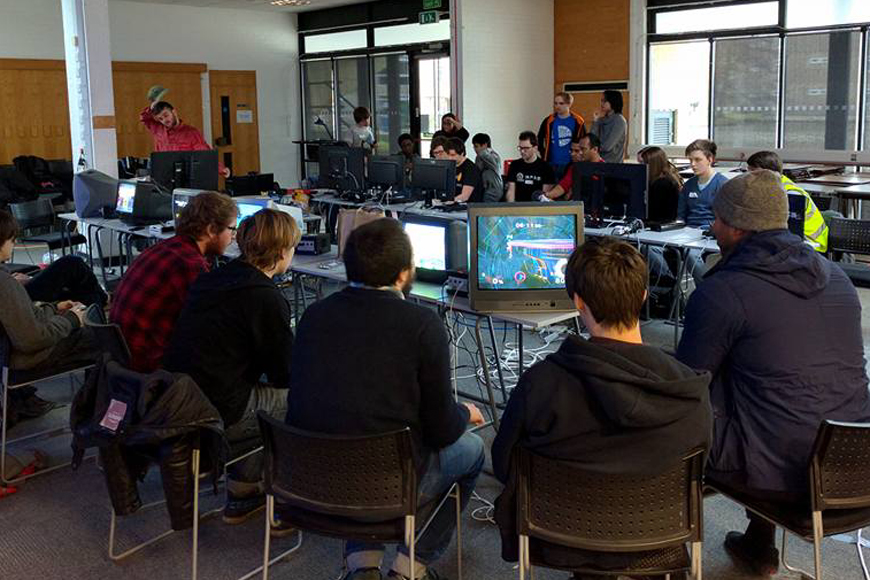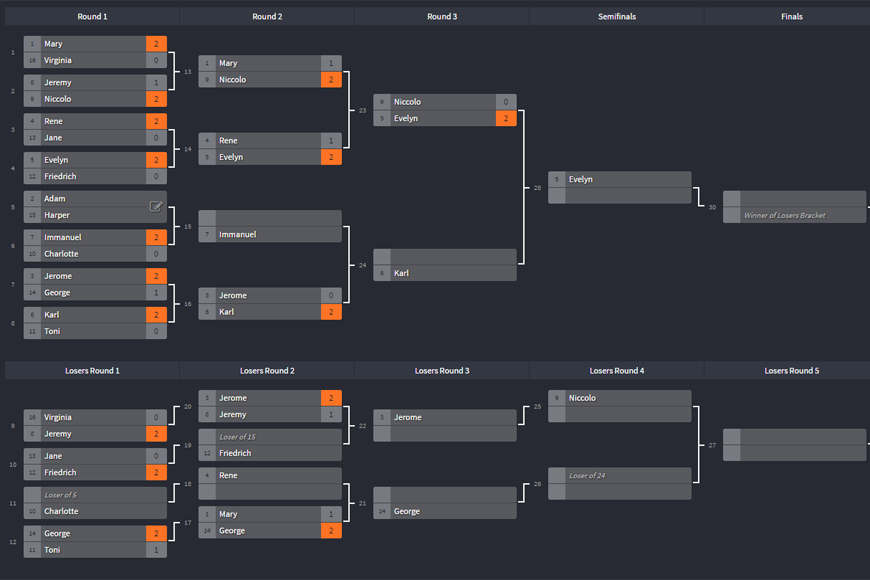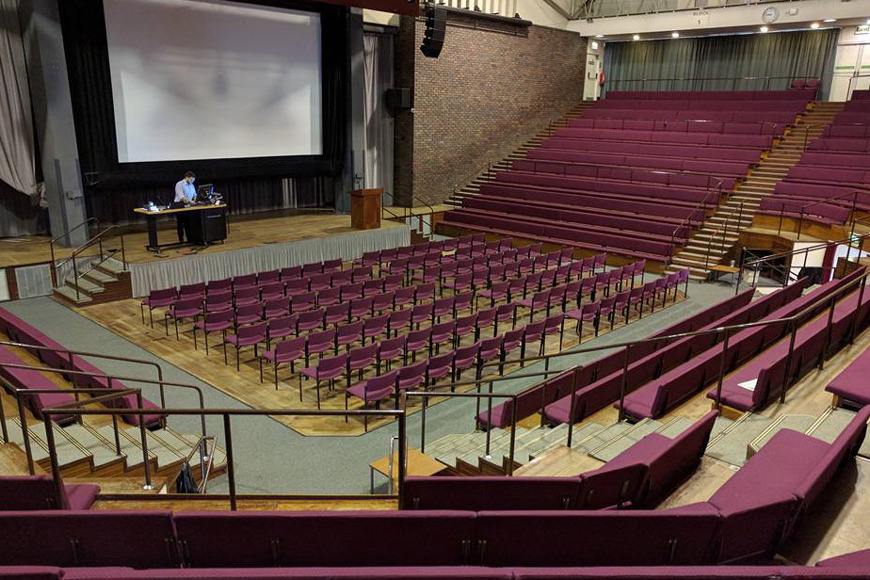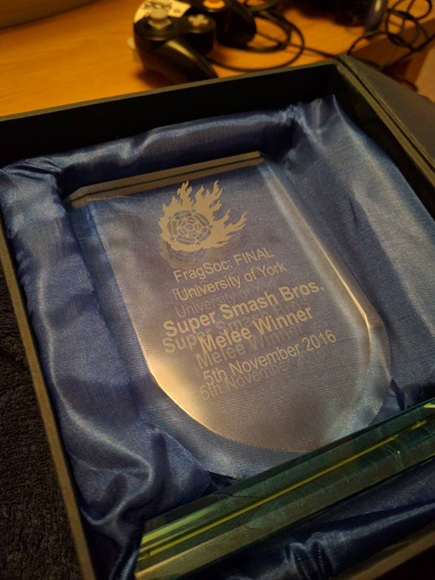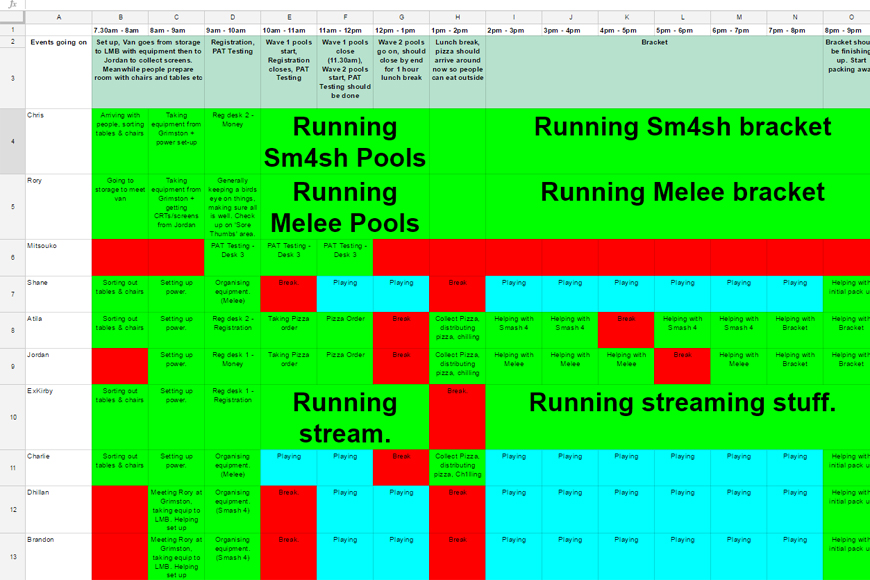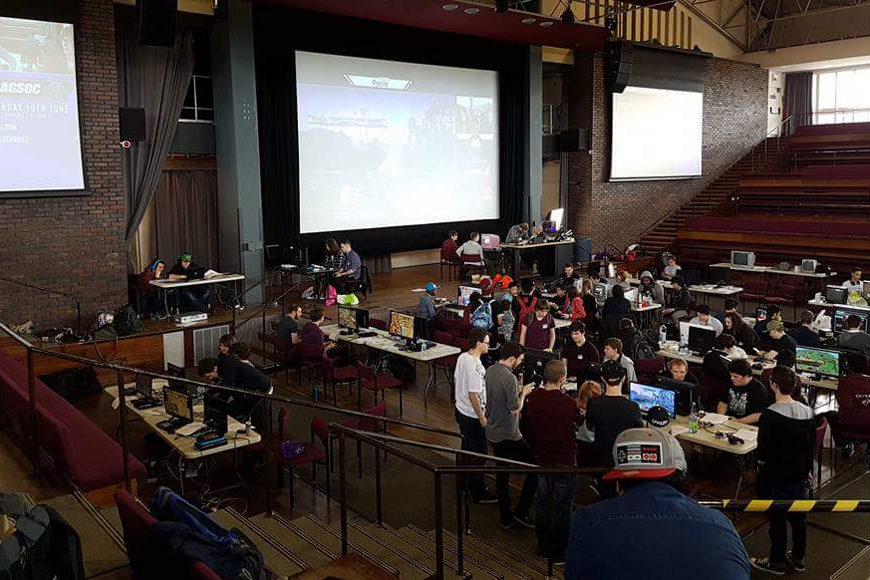Chris Williams, Chair of Fragsoc (University of York’s video gaming and LAN society), regularly hosts LAN tournaments for more than 100 people.
In this article, he presents a step-by-step guide on how to organise your own grassroots esports tournament.
1. Travel to other people’s events & become part of the community
As with most things, the first step of organising a good tournament is doing your homework. Often, the most enjoyable and well-run events are put on by regular gamers who would like to see more of them, while TOs (Tournament Organisers) with little or no understanding of a community’s needs will likely find attendants disgruntled, due to simple errors the organiser was not aware of.
There is no better way of learning what competitors like and don’t like to see than by being one yourself, so find out what is going on in your local area and if you can afford to, travel to a few big events in order to get a wide range of ideas for your own competition.
Every tournament is different because every organiser is different, so don’t think that once you’ve seen one you’ve seen them all. Plus you can try asking the people in charge for some tips and advice – or see what attendees particularly like or dislike at the venue.
Most importantly, take an active part in the scene at these events, as it will show people you have passion for the game and that you are not just there to advertise. Gaining and keeping players is vital if you’re to build a level of trust between yourself and the community. If you do this successfully, tell them about your own tournament that you plan to run – this will spread awareness and hopefully increase your numbers.
“Gaining and keeping players is vital if you’re to build a level of trust between yourself and the community.”
2. Start off small & learn how to allot time
It is imperative you do not attempt to host a large tournament straight away, as your inexperience will likely spell failure.
If you are running a FIFA or Smash Bros event, for example (with single entrants rather than teams of five or six), try going for eight to 16 entrants initially, so you can iron out any early mistakes. Believe me, you will make mistakes. When starting out you need a core group of players who will regularly attend your events, without this you cannot hope to grow your scene, as it provides essential security to your tournament, giving you a base attendance you can rely on.
Starting off small is also necessary because it will give you a sense of timings, for example how long it takes for games to be played (trust me, people are slooow). This is probably the most useful skill a TO can have.
Being able to accurately allot time and avoid people waiting around is the absolute key to success, as what competitors hate more than anything else is having to sit around doing nothing. This is where experience becomes essential; the most common error I have seen in UK tournaments is a TO who underestimates the amount of time a series will take, making players and viewers alike wait around for one game which was unexpectedly long.
For each event you should aim to increase your attendance by 16, so if you start off with 16 you then have 32, 48, 64 etc at future events. Obviously as you near the 100 mark you can consider doubling your increment to 32, but be careful not to overload yourself.
A badly run tournament due to incapable TOs will not be forgotten easily – and you will find it extremely hard to retain credibility if you bite off more than you can chew.
3. Find a venue
This will likely be your greatest challenge. You will need to find a venue appropriate to the size of your event, so for example if you have 16 entrants one large room will suffice, but 64 entrants will obviously require a large hall.
If you live in a house, consider using your living room for your first tournament (with the owner/resident’s permission of course), as this will require no financial investment and allows you a great deal of flexibility in planning the layout. However, as the competition size increases so must the building you hold it in, so here are some suggestions for places you can host your tourney:
Community Centres
In the UK most boroughs will have at least one community centre where local groups hold game nights and social activities. These buildings are usually the perfect size for a medium level tournament with decent facilities such as drinking water and a kettle (goes down very well if they have a microwave too)!
Religious buildings
Churches have been known to accommodate gaming tournaments in the past, as they will often have a hall or building other than the church itself, commonly used for religious communities to gather when not worshipping.
Schools/colleges/universities
If you are a student, this is almost definitely your best bet. Ask or email a member of staff how you might go about using a hall or large room for a day event and they should direct you to a site manager.
Sports clubs – There is a tennis club near where I live that plays host to a Bridge society once a week with at least 30 people. Sports clubs almost always have a hut or building for members to congregate that will not be in use during certain times, so this is a really good option that few people consider.
Private venues
Once you have established a core group of 20-25 players who you’re certain are attending, you can add on a venue fee (£5 per person is a fair rate) and hire out your own private building for a day. This is definitely something to think about for when your scene grows and attendees are well aware of the event.
Remember to always ask politely for permission from whoever manages the building, as they will be far less likely to say yes if you are disrespectful or ungrateful. As well as this, ensure afterwards that the place is left just as you found it; having a good relationship with the owner is paramount if you want to keep using the venue.
“It is worth thinking about a unique selling point (USP) you can market to people that will separate you from other events: a good one being a nice trophy to go along with the prize pool. Be as creative as you like.”
4. Get great event crew
Find a group of volunteers to help you run the event. Doing it by yourself is asking to fail.
Very carefully explain what jobs each person will be doing – and make sure to give them enough work without overloading anyone. If you manage to effectively delegate responsibility to your event crew, you will be able to run your tournament with full concentration, thus making it a more enjoyable experience for the participants who will then feed back to their friends about how well run it was.
5. Have a strong online presence & incentivize players to attend
By this point you should have set a date for your tournament and begun taking signups for players.
Create a Facebook event and utilise all social media at your disposal to spread the word, for example by posting in forums for UK gaming communities (especially relating to the particular game) and Facebook groups.
Discord is also a good way to reach out directly to gamers; just link the event with a brief explanation of what is happening and where. If you followed step one correctly, this is the time to go to events near you (e.g. if you are in York, try Leeds) as much as possible to try and promote your tournament. Speaking to people in person makes a huge difference.
Have something you can offer to players if they bring equipment, for example money off their entry fee, as events which require many consoles or computers can be difficult to field gear for.
On top of this, as your tournaments grow larger, you can contact local shops that market towards gamers and offer them a space to advertise in your venue, for example by putting consoles up with games that players can use while they wait to play their matches. Consider contacting companies for sponsorship deals as you won’t need a lot of money; certain businesses such as Red Bull are always on the lookout for ways to expand their brand reach.
It is also worth thinking about a unique selling point (USP) you can market to people that will separate you from other events: a good one being a nice trophy to go along with the prize pool. Be as creative as you like. There was a Smash Melee tournament that offered a cape with a cool sword pattern on the back as first place prize, which was very effective at inspiring a competitive vibe.
Remember, leading up to your event put out regular updates on social media informing your attendants of what you are doing to make the tournament an enjoyable one. This will boost trust in your organisation skills and generate hype. For example, if you order a trophy, when it arrives take a picture and put it on the Facebook event – this has proven to be an extremely effective motivator.
“Finding the right venue will likely be your greatest challenge.”
6. Run the event well, be nice to people
The day of your tournament has finally come, after months of preparation and planning this is where it all counts. Come up with a schedule a couple of days beforehand detailing exactly what has to happen at what times.
It is easy to end up in a situation where you wonder if jobs need to be done, but a well-made plan can ensure you do not forget anything, allowing you to sit back and breathe if all the tasks are being carried out.
Remember that if something not according to plan happens, don’t panic. Come up with a back-up plan for things that you are worried about beforehand, but if you find yourself unsure of what to do, ask other people for advice and make the best of your circumstances.
Players can be very understanding – you are offering them a service for which they should be grateful, so don’t worry about people angrily turning on you, you’re the boss after all!
It is wise to keep an eye on yourself when interacting with players, if you are stressed you may unintentionally come across as rude or unpleasant without meaning to (this happened to me during my first tournament, but I apologised later and explained I was under pressure).
Try to be warm and welcoming as you are the figurehead of the tournament and see that your event crew are the same. Making a good impression as a friendly community will go a long way in getting you more attendants at your next event.
“Remember to give yourself a break before you organise the next event, not only is it stressful but anticipation is key to building hype.”
7. Pat yourself and your event crew on the back, build friendships
Assuming all goes well, your entrants will be returning happy with lots of good things to say about the new/continuing tournaments you are running.
Remember to give yourself a break before you do the next one, not only is it stressful but anticipation is key to building hype. Make sure you are very grateful to whoever helped you run the event, including the venue owner and any sponsors/companies who may have turned out to advertise. Also take pictures to showcase the success of your event online, as it will help develop your reputation as a competent TO.
Speak to members of other gaming scenes who may have come to your tournament, as they can be instrumental in helping you garner attention across the country depending on how ambitious you are. All in all keep an eye out for opportunities to improve your standing and reputation with communities in other parts of the country, as a good reputation can make or break whether people decide to come or not.
As your event grows, make sure to contact Esports News UK and let them know about it!
Sit back and enjoy
Congratulations, if you have followed all these steps correctly you will have created your own grassroots tournament from scratch. It is an extremely valuable, rewarding experience.
If you continue, you will certainly build a strong community that will never forget your contribution to it.
About the author

He was Chair of Fragsoc (the University of York’s video gaming and LAN society) during 2016 Roses, the largest sporting varsity in Europe – and the first year in which esports was added to the points roster.
Web: http://fragsoc.co.uk/wpsite/
Twitter: https://twitter.com/fragsoc?lang=en

